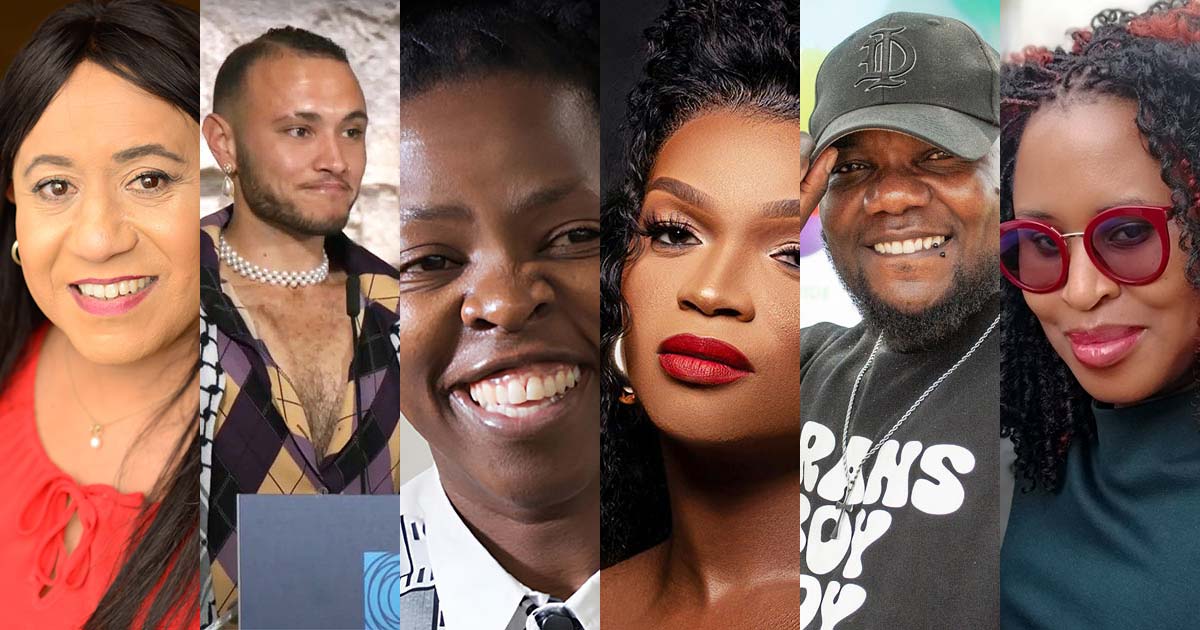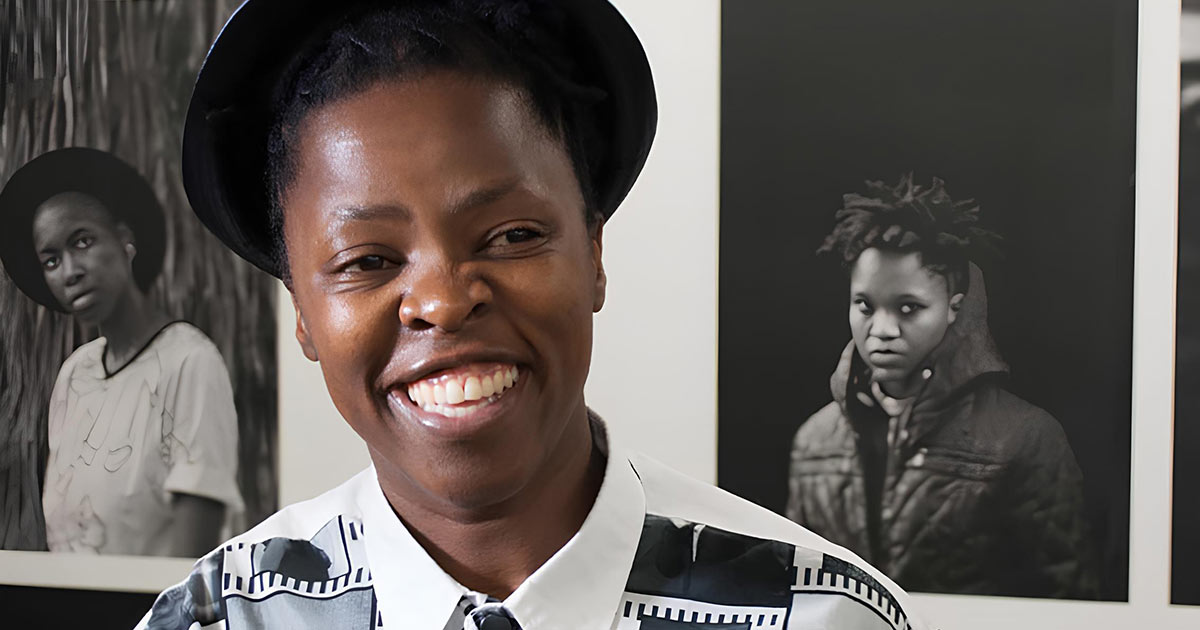6 Non-Binary and Transgender Trailblazers from Southern Africa

These non-binary and transgender trailblazers are boldly making change through their work and visibility
Across Southern Africa, trans and gender-diverse people are courageously stepping into leadership, visibility, and advocacy—not just for themselves, but for the benefit of their LGBTQI+ communities.
From courtrooms and media platforms to grassroots spaces and global stages, these individuals are challenging stigma, creating opportunities, and sparking vital conversations.
Here, we celebrate six trans and non-binary groundbreakers, in no particular order, who are using their voices, platforms and experiences to build a more inclusive and empowered future.
1. Rikki Nathanson (Zimbabwe)

In 2014, Rikki Nathanson was arrested in Zimbabwe for using a women’s bathroom and forced to undergo humiliating physical examinations. Rather than backing down, she took the matter to court—and won. The ruling recognised her gender identity and awarded her damages, setting a powerful precedent in defence of trans rights across Africa.
“Governments can no longer sit-back while vulnerable persons such as transgender persons face ongoing stigma, humiliation and discrimination with impunity at the hands of public authorities,” she said after her victory. “I hope that this case will send a strong message that we are all human and that our diversity should be celebrated. My wish is for society to be more tolerant where LGBT persons are not in constant fear of being targeted.”
Rikki is the founder of TREAT (Trans Research Education Advocacy and Training) and serves on global LGBTQI+ advocacy boards. Her work is rooted in dignity, education, and justice. Now based in the United States, she is making an impact globally as the Senior Advisor of the Global Trans Program at Outright International. In 2019, she was awarded the Felipe de Souza Award, which recognises the courage and activism of grassroots groups and individuals,
2. Yaya Mavundla (South Africa)

Yaya Mavundla is a fashion icon, media personality, and unapologetic advocate for trans visibility. Whether starring in the hit reality series Becoming, making history on magazine covers, stepping in to help a victim of Grindr gang criminals, or hosting the first-ever International Pride Awards in South Africa, Yaya is using her influence to shift culture.
Her activism is deeply rooted in the need for equality, access, and pride in one’s identity.
In her TedTalk, she said, “South Africa has been at the forefront of LGBTQI+ rights, not just in Africa but around the world. At the same time, even with our constitutional protections and legacy of activism, we have much more work to do to achieve equality.”
Yaya is undoubtedly one of the most visible trans public figures in South Africa, making full use of her glamorous platform to educate and create change.
3. Tshepo Ricki Kgositau (Botswana)

In 2017, Ricki Kgositau took the Botswana government to court to have her gender legally recognised—and she won. The decision was a landmark for trans rights on the continent, asserting that denying her recognition violated her fundamental rights.
Kgositau argued that the country’s refusal to acknowledge her as a woman infringed on her rights to dignity, privacy, freedom of expression, equal protection of the law, freedom from discrimination and freedom from inhumane and degrading treatment.
Kgositau said the ruling was an important step in “ensuring that the rights of those that are deemed as inferior, as a minority to everybody else, need to also be upheld.”
Ricki went on to serve as Executive Director of Gender DynamiX in South Africa for several years, leading efforts to strengthen trans rights and policies. She is now Regional Manager (Africa) for the Global Equality Caucus, an international network of parliamentarians and elected representatives dedicated to tackling discrimination against LGBTQI+ people.
4. Thomars Shamuyarira (Zimbabwe)

Thomars Shamuyarira is a proudly out trans man from Harare, Zimbabwe, whose journey has been marked by both profound hardship and powerful resilience. After being disowned by his family and forced to flee his home country due to his LGBTQI+ identity, Thomars found both purpose and strength in advocacy.
Now based in South Africa, he is the founder of The Fruit Basket, a vital organisation dedicated to supporting LGBTQI+ refugees, migrants, and asylum seekers. Through his work, Thomars has become a lifeline for many displaced individuals facing the intersection of xenophobia, transphobia, and a dehumanising asylum system.
“My passion for helping others, combined with the frustration of not being able to find assistance, led to the creation of The Fruit Basket,” he said. The Fruit Basket offers direct support through skills development programs, relief services, and two safe houses for LGBTQI+ refugees in Johannesburg. “Offering protection to those in need is not only lawful but also an act of kindness and decency,” he declared.
5. Zanele Muholi (South Africa)

Zanele Muholi (Photo: David Penney)
Renowned visual activist Zanele Muholi has spent over two decades turning the lens toward South Africa’s Black LGBTQI+ community, capturing moments of intimacy, resistance, and unapologetic pride. Born in Umlazi township in 1972, Muholi uses photography not just as art—but as a form of activism, archiving lives that have long been ignored or erased.
Their powerful body of work has received global recognition, with more than 250 pieces featured in a travelling retrospective across Europe—including showings at the Tate Modern in London, Berlin, Denmark, Reykjavik, and at the Maison Européenne de la Photographie (MEP) in Paris.
For Muholi, visibility is not optional—it is essential. “Visibility for LGBTI people should be like … food and water! We can’t only be visible when it’s Pride because we don’t live our lives for just one day of the year. We exist 365 days, throughout the whole year! And this visibility needs not even to be negotiated; it needs to be part of the society,” they said.
Through every portrait and exhibition, Muholi reminds us that being seen is a radical act—and that representation, when rooted in truth and love, can shift culture and save lives.
6. Omar van Reenen (Namibia)

Non-binary Namibian activist Omar van Reenen has become one of the most prominent LGBTQI+ rights activists in their country as the co-founder of the organisation Equal Namibia. They are particularly passionate about inspiring young Namibians to stand up for their rights.
The organisation has led strategic litigation efforts, including cases against the Namibian government, and played a pivotal role in landmark Supreme Court victories, such as the recognition of same-sex marriages abroad and the end of arbitrary arrests of transgender individuals.
In 2024, van Reenen became the first LGBTQI+ rights activist to win the prestigious Kofi Annan NextGen Democracy Prize, which recognises young leaders aged between 18 and 30.
“There is nothing un-African about us,” van Reenen said at the time. “In fact, our queer existence is African. We are the essence of African values. These values are of love, community and humanity. And they will never and can never criminalise love, because love is Ubuntu and Ubuntu is African, and I am African too.”
They currently also serve as a Strategic Alliances & Coalitions Consultant for ILGA World, focusing on building global partnerships to advance LGBTQI+ people’s rights.
The Power of Living Out Loud
These six changemakers are reshaping what it means to be trans and gender diverse in Southern Africa—not just by being visible, but by being of service. Through their victories, platforms, and lived truths, they are helping communities understand, accept, and uplift trans lives.
They remind us that trans people are not only part of society—they are actively building a better one. Let us honour their work, follow their lead, and continue creating a world where trans people are free to live, lead, and love without fear.
Article by Nompilo Gwala.
This article was made possible with the support of the Other Foundation. The views expressed herein do not necessarily represent those of the Other Foundation. www.theotherfoundation.org.
©2025 MambaOnline. This article is licensed under a Creative Commons Attribution-NoDerivatives 4.0 International License. You may republish this article, so long as you credit the authors and MambaOnline, and do not change the text. Please include a link back to the original article.
Leave a Reply